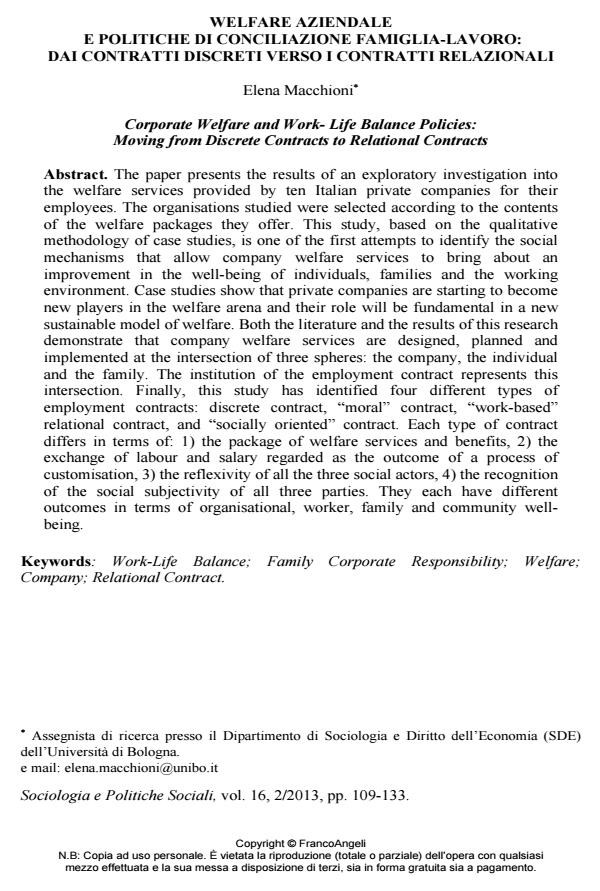Welfare aziendale e politiche di conciliazione famiglia-lavoro: dai contratti discreti verso i contratti relazionali
Titolo Rivista SOCIOLOGIA E POLITICHE SOCIALI
Autori/Curatori Elena Macchioni
Anno di pubblicazione 2013 Fascicolo 2013/2
Lingua Italiano Numero pagine 25 P. 109-133 Dimensione file 713 KB
DOI 10.3280/SP2013-002006
Il DOI è il codice a barre della proprietà intellettuale: per saperne di più
clicca qui
Qui sotto puoi vedere in anteprima la prima pagina di questo articolo.
Se questo articolo ti interessa, lo puoi acquistare (e scaricare in formato pdf) seguendo le facili indicazioni per acquistare il download credit. Acquista Download Credits per scaricare questo Articolo in formato PDF

FrancoAngeli è membro della Publishers International Linking Association, Inc (PILA), associazione indipendente e non profit per facilitare (attraverso i servizi tecnologici implementati da CrossRef.org) l’accesso degli studiosi ai contenuti digitali nelle pubblicazioni professionali e scientifiche.
The paper presents the results of an exploratory investigation into the welfare services provided by ten Italian private companies for their employees. The organisations studied were selected according to the contents of the welfare packages they offer. This study, based on the qualitative methodology of case studies, is one of the first attempts to identify the social mechanisms that allow company welfare services to bring about an improvement in the well-being of individuals, families and the working environment. Case studies show that private companies are starting to become new players in the welfare arena and their role will be fundamental in a new sustainable model of welfare. Both the literature and the results of this research demonstrate that company welfare services are designed, planned and implemented at the intersection of three spheres: the company, the individual and the family. The institution of the employment contract represents this intersection. Finally, this study has identified four different types of employment contracts: discrete contract, "moral" contract, "work-based" relational contract, and "socially oriented" contract. Each type of contract differs in terms of: 1) the package of welfare services and benefits, 2) the exchange of labour and salary regarded as the outcome of a process of customisation, 3) the reflexivity of all the three social actors, 4) the recognition of the social subjectivity of all three parties. They each have different outcomes in terms of organisational, worker, family and community wellbeing.
Parole chiave:Work-Life Balance; Family Corporate Responsibility; Welfare; Company; Relational Contract.
- Le politiche di conciliazione tra residualità e frammentarietà. Il caso di un co-working con spazio baby a Roma Giovanna Campanella, Luisa De Vita, in SOCIOLOGIA E POLITICHE SOCIALI 1/2018 pp.97
DOI: 10.3280/SP2018-001007 - Rethinking Work-Family Balance in Italy: Case Studies and Innovative Strategies Isabella Crespi, Melanie Sara Palermo, in Corvinus Journal of Sociology and Social Policy /2024 pp.103
DOI: 10.14267/CJSSP.2024.1.5
Elena Macchioni, Welfare aziendale e politiche di conciliazione famiglia-lavoro: dai contratti discreti verso i contratti relazionali in "SOCIOLOGIA E POLITICHE SOCIALI" 2/2013, pp 109-133, DOI: 10.3280/SP2013-002006